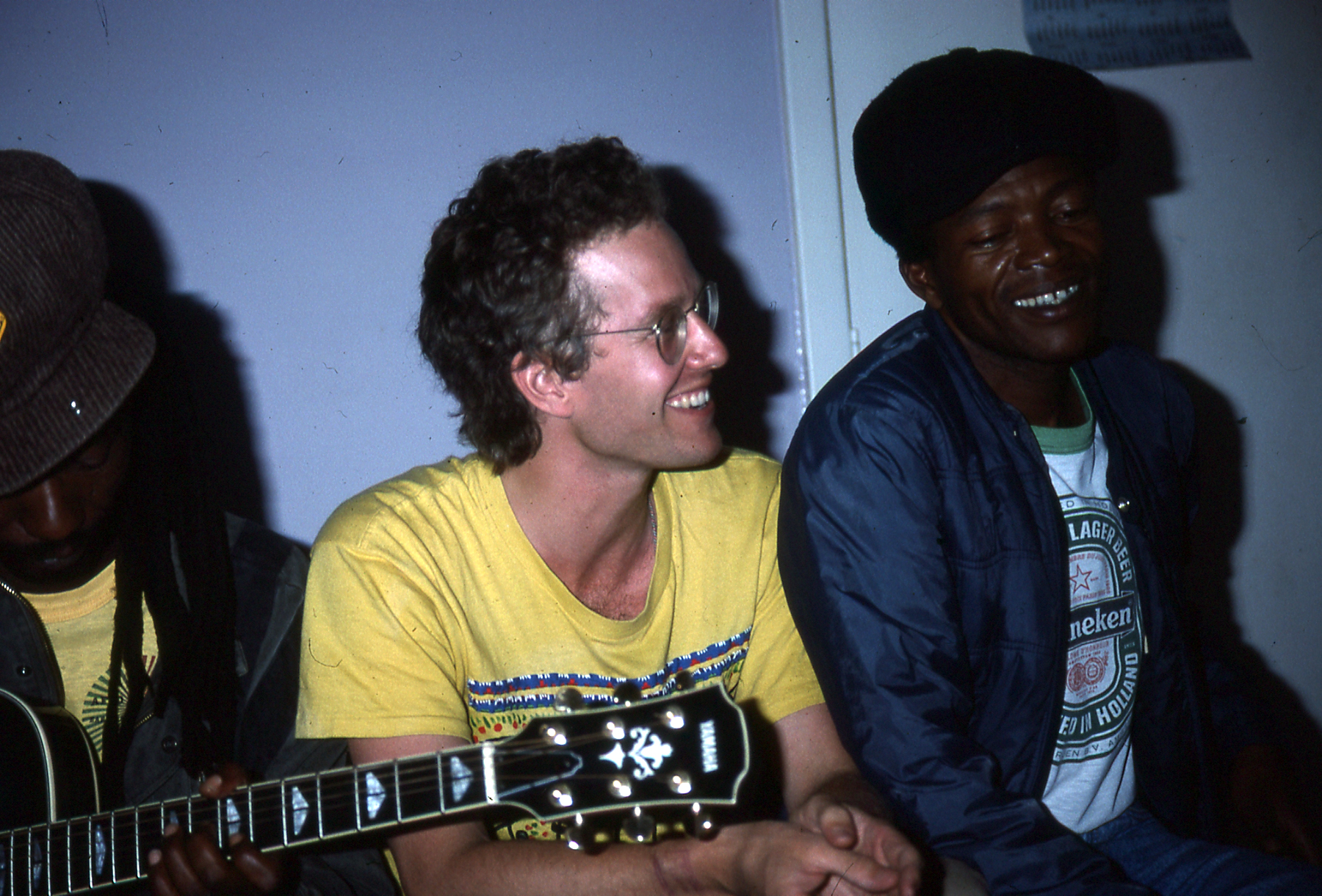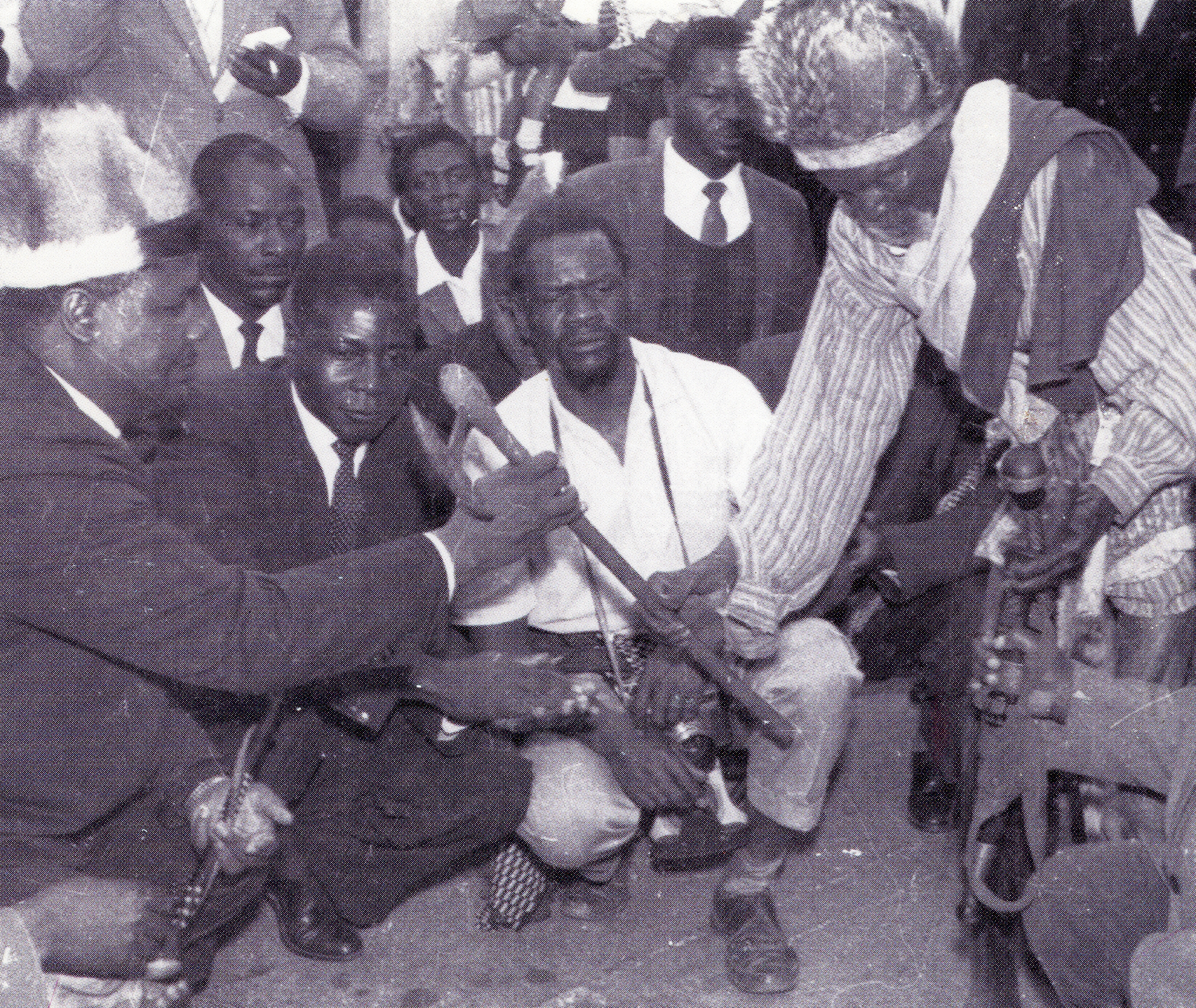Blog February 12, 2013
Mapfumo 2: Mugabe Years--Producer's notes
Over the past few months, I’ve been puling together a Hip Deep program on music and politics in Zimbabwe. Specifically, this is the second installment in Afropop’s telling of the Thomas Mapfumo story. Our 2007 program, “Thomas Mapfumo: The War Years” dealt with Mapfumo’s early career as a champion of African culture and liberation during the combative 1970s, when Zimbabweans fought to throw off colonial Rhodesian rule. That program ended in 1980, after Thomas’s jailing and release on condition that he played at a rally for Bishop Abel Muzorewa, a transitional figure who ended up tarred as a sellout, since his government did not involve the guerilla fighters.
At the big independence celebration in 1980, Thomas Mapfumo was included, but also shunned by Robert Mugabe’s ZANU party cronies. And that’s where this new program picks up. Looking back on all that has happened over the subsequent years—all the songs, the dramas, the interviews Afropop has collected, I had to make tough choices to keep this program anywhere near one hour. (The online version available on afropop.org clocks in at 67 minutes, including about 8 minutes of bonus material.)
[caption id="attachment_7082" align="aligncenter" width="600"] Thomas, Banning, Jonah Sithole, Harare (Barlow 1988)[/caption]
A few notes. In the program, poet Musa Zimunya discusses the origins of the Matabeleland crisis of the early 1980s. The new Zimbabwean government’s violent campaign against “dissidents” in Matabeleland has both political and ethnic dimensions. Musa traces the political split between the ZANU and ZAPU parties to ZAPU leader Joshua Nkomo’s dissatisfaction at having been given Ministry of Home Affairs, rather than the presidency. Historian Mhoze Chikowero points out in a comment on the script, “If you read Nkomo’s book and some other commentary, it’s the other way round. He viewed the presidency as a useless ceremonial post. For some of his followers, I think the real issue was the loss in the elections which the party thought they were going to win, and which people like the British and sections of Rhodesia society preferred to the hated ‘Marxist’ Mugabe.” In any case, as the program notes, the split between ZANU and ZAPU had dire consequences, ultimately resolved by the unity pact of 1987, by which time some 20,000 had died in Matabeleland.
[caption id="attachment_7083" align="aligncenter" width="593"]
Thomas, Banning, Jonah Sithole, Harare (Barlow 1988)[/caption]
A few notes. In the program, poet Musa Zimunya discusses the origins of the Matabeleland crisis of the early 1980s. The new Zimbabwean government’s violent campaign against “dissidents” in Matabeleland has both political and ethnic dimensions. Musa traces the political split between the ZANU and ZAPU parties to ZAPU leader Joshua Nkomo’s dissatisfaction at having been given Ministry of Home Affairs, rather than the presidency. Historian Mhoze Chikowero points out in a comment on the script, “If you read Nkomo’s book and some other commentary, it’s the other way round. He viewed the presidency as a useless ceremonial post. For some of his followers, I think the real issue was the loss in the elections which the party thought they were going to win, and which people like the British and sections of Rhodesia society preferred to the hated ‘Marxist’ Mugabe.” In any case, as the program notes, the split between ZANU and ZAPU had dire consequences, ultimately resolved by the unity pact of 1987, by which time some 20,000 had died in Matabeleland.
[caption id="attachment_7083" align="aligncenter" width="593"] Mugabe and Nkomo, 1962[/caption]
Coming to Mapfumo and his musical evolution after independence, I avoid the whole question of market consideration that may have influenced, for example, his choice to bring mbiras into the band lineup. I went over this in some detail with Thomas Turino in the interview for part 1 of this series, “The War Years.” Turino’s emphasis on market considerations in his book Nationalists, Cosmopolitans, and Popular Music in Zimbabwe is well known. I feel the point is somewhat overstated, in part because Turino was writing before Mapfumo had shown his true grit as a critic of the Mugabe regime—a move that had short-term commercial benefits but has ultimately made it much harder for the artist to profit from his work. Also, regarding mbira, I believe that Thomas brought mbiras into the band because it fulfilled a long-held ambition stemming from a lifelong love with the instrument. I don’t think it had much of anything to do with his desire to court “worldbeat aesthetics.” I refer those curious about that subject to the transcript of my 2007 interview with Thomas Turino.
When it comes to the land question, there is obviously a lot more to unpack than we could do in this program, mostly focused on Mapfumo’s songs commenting on the situation. Historian Chikowero is sympathetic to Mapfumo’s cultural politics, though not necessarily his position on land. Professor Chikowero speaks about doing “the popular thing in the wrong way,” and suggests that Mugabe faced so many obstacles to an orderly, lawful approach to land reform that a crisis was inevitable. He rightly notes that all Zimbabweans agree on the need for land reform, but he pushes back on Mapfumo’s claim that Mugabe’s approach “farmed hunger” in Zimbabwe.
One thing that interests me is the role of the Economic Structural Adjustment Program (ESAP)—what we now call “austerity”—in the 90s in Zimbabwe. Mhoze Chikowero calls the program ruinous. Mapfumo, on the other hand, once told me that if the ESAP policies had actually been carried out, things would have been much better. There is an open question as to how much actual “austerity” Mugabe implemented. I have read that he did little, and mostly used ESAP as a whipping boy to blame for all that went wrong in the 90s. Chikowero clearly believes that the ESAP policies did real damage. Another question beyond the scope of this program, but important to understand in studying the dramatic decline of the Zimbabwean economy after 1997.
I hope listerners and readers interested in Zimbabwean will comment on our site, or write to info@afropop.org with thoughts about these and other questions raised by the two Mapfumo programs. I have recently completed a manuscript of a book about all of this, and am now shopping it to publishers. But, of course, Mapfumo’s story, and Zimbabwe’s, continue to unfold.
Mugabe and Nkomo, 1962[/caption]
Coming to Mapfumo and his musical evolution after independence, I avoid the whole question of market consideration that may have influenced, for example, his choice to bring mbiras into the band lineup. I went over this in some detail with Thomas Turino in the interview for part 1 of this series, “The War Years.” Turino’s emphasis on market considerations in his book Nationalists, Cosmopolitans, and Popular Music in Zimbabwe is well known. I feel the point is somewhat overstated, in part because Turino was writing before Mapfumo had shown his true grit as a critic of the Mugabe regime—a move that had short-term commercial benefits but has ultimately made it much harder for the artist to profit from his work. Also, regarding mbira, I believe that Thomas brought mbiras into the band because it fulfilled a long-held ambition stemming from a lifelong love with the instrument. I don’t think it had much of anything to do with his desire to court “worldbeat aesthetics.” I refer those curious about that subject to the transcript of my 2007 interview with Thomas Turino.
When it comes to the land question, there is obviously a lot more to unpack than we could do in this program, mostly focused on Mapfumo’s songs commenting on the situation. Historian Chikowero is sympathetic to Mapfumo’s cultural politics, though not necessarily his position on land. Professor Chikowero speaks about doing “the popular thing in the wrong way,” and suggests that Mugabe faced so many obstacles to an orderly, lawful approach to land reform that a crisis was inevitable. He rightly notes that all Zimbabweans agree on the need for land reform, but he pushes back on Mapfumo’s claim that Mugabe’s approach “farmed hunger” in Zimbabwe.
One thing that interests me is the role of the Economic Structural Adjustment Program (ESAP)—what we now call “austerity”—in the 90s in Zimbabwe. Mhoze Chikowero calls the program ruinous. Mapfumo, on the other hand, once told me that if the ESAP policies had actually been carried out, things would have been much better. There is an open question as to how much actual “austerity” Mugabe implemented. I have read that he did little, and mostly used ESAP as a whipping boy to blame for all that went wrong in the 90s. Chikowero clearly believes that the ESAP policies did real damage. Another question beyond the scope of this program, but important to understand in studying the dramatic decline of the Zimbabwean economy after 1997.
I hope listerners and readers interested in Zimbabwean will comment on our site, or write to info@afropop.org with thoughts about these and other questions raised by the two Mapfumo programs. I have recently completed a manuscript of a book about all of this, and am now shopping it to publishers. But, of course, Mapfumo’s story, and Zimbabwe’s, continue to unfold.
 Thomas, Banning, Jonah Sithole, Harare (Barlow 1988)[/caption]
A few notes. In the program, poet Musa Zimunya discusses the origins of the Matabeleland crisis of the early 1980s. The new Zimbabwean government’s violent campaign against “dissidents” in Matabeleland has both political and ethnic dimensions. Musa traces the political split between the ZANU and ZAPU parties to ZAPU leader Joshua Nkomo’s dissatisfaction at having been given Ministry of Home Affairs, rather than the presidency. Historian Mhoze Chikowero points out in a comment on the script, “If you read Nkomo’s book and some other commentary, it’s the other way round. He viewed the presidency as a useless ceremonial post. For some of his followers, I think the real issue was the loss in the elections which the party thought they were going to win, and which people like the British and sections of Rhodesia society preferred to the hated ‘Marxist’ Mugabe.” In any case, as the program notes, the split between ZANU and ZAPU had dire consequences, ultimately resolved by the unity pact of 1987, by which time some 20,000 had died in Matabeleland.
[caption id="attachment_7083" align="aligncenter" width="593"]
Thomas, Banning, Jonah Sithole, Harare (Barlow 1988)[/caption]
A few notes. In the program, poet Musa Zimunya discusses the origins of the Matabeleland crisis of the early 1980s. The new Zimbabwean government’s violent campaign against “dissidents” in Matabeleland has both political and ethnic dimensions. Musa traces the political split between the ZANU and ZAPU parties to ZAPU leader Joshua Nkomo’s dissatisfaction at having been given Ministry of Home Affairs, rather than the presidency. Historian Mhoze Chikowero points out in a comment on the script, “If you read Nkomo’s book and some other commentary, it’s the other way round. He viewed the presidency as a useless ceremonial post. For some of his followers, I think the real issue was the loss in the elections which the party thought they were going to win, and which people like the British and sections of Rhodesia society preferred to the hated ‘Marxist’ Mugabe.” In any case, as the program notes, the split between ZANU and ZAPU had dire consequences, ultimately resolved by the unity pact of 1987, by which time some 20,000 had died in Matabeleland.
[caption id="attachment_7083" align="aligncenter" width="593"] Mugabe and Nkomo, 1962[/caption]
Coming to Mapfumo and his musical evolution after independence, I avoid the whole question of market consideration that may have influenced, for example, his choice to bring mbiras into the band lineup. I went over this in some detail with Thomas Turino in the interview for part 1 of this series, “The War Years.” Turino’s emphasis on market considerations in his book Nationalists, Cosmopolitans, and Popular Music in Zimbabwe is well known. I feel the point is somewhat overstated, in part because Turino was writing before Mapfumo had shown his true grit as a critic of the Mugabe regime—a move that had short-term commercial benefits but has ultimately made it much harder for the artist to profit from his work. Also, regarding mbira, I believe that Thomas brought mbiras into the band because it fulfilled a long-held ambition stemming from a lifelong love with the instrument. I don’t think it had much of anything to do with his desire to court “worldbeat aesthetics.” I refer those curious about that subject to the transcript of my 2007 interview with Thomas Turino.
When it comes to the land question, there is obviously a lot more to unpack than we could do in this program, mostly focused on Mapfumo’s songs commenting on the situation. Historian Chikowero is sympathetic to Mapfumo’s cultural politics, though not necessarily his position on land. Professor Chikowero speaks about doing “the popular thing in the wrong way,” and suggests that Mugabe faced so many obstacles to an orderly, lawful approach to land reform that a crisis was inevitable. He rightly notes that all Zimbabweans agree on the need for land reform, but he pushes back on Mapfumo’s claim that Mugabe’s approach “farmed hunger” in Zimbabwe.
One thing that interests me is the role of the Economic Structural Adjustment Program (ESAP)—what we now call “austerity”—in the 90s in Zimbabwe. Mhoze Chikowero calls the program ruinous. Mapfumo, on the other hand, once told me that if the ESAP policies had actually been carried out, things would have been much better. There is an open question as to how much actual “austerity” Mugabe implemented. I have read that he did little, and mostly used ESAP as a whipping boy to blame for all that went wrong in the 90s. Chikowero clearly believes that the ESAP policies did real damage. Another question beyond the scope of this program, but important to understand in studying the dramatic decline of the Zimbabwean economy after 1997.
I hope listerners and readers interested in Zimbabwean will comment on our site, or write to info@afropop.org with thoughts about these and other questions raised by the two Mapfumo programs. I have recently completed a manuscript of a book about all of this, and am now shopping it to publishers. But, of course, Mapfumo’s story, and Zimbabwe’s, continue to unfold.
Mugabe and Nkomo, 1962[/caption]
Coming to Mapfumo and his musical evolution after independence, I avoid the whole question of market consideration that may have influenced, for example, his choice to bring mbiras into the band lineup. I went over this in some detail with Thomas Turino in the interview for part 1 of this series, “The War Years.” Turino’s emphasis on market considerations in his book Nationalists, Cosmopolitans, and Popular Music in Zimbabwe is well known. I feel the point is somewhat overstated, in part because Turino was writing before Mapfumo had shown his true grit as a critic of the Mugabe regime—a move that had short-term commercial benefits but has ultimately made it much harder for the artist to profit from his work. Also, regarding mbira, I believe that Thomas brought mbiras into the band because it fulfilled a long-held ambition stemming from a lifelong love with the instrument. I don’t think it had much of anything to do with his desire to court “worldbeat aesthetics.” I refer those curious about that subject to the transcript of my 2007 interview with Thomas Turino.
When it comes to the land question, there is obviously a lot more to unpack than we could do in this program, mostly focused on Mapfumo’s songs commenting on the situation. Historian Chikowero is sympathetic to Mapfumo’s cultural politics, though not necessarily his position on land. Professor Chikowero speaks about doing “the popular thing in the wrong way,” and suggests that Mugabe faced so many obstacles to an orderly, lawful approach to land reform that a crisis was inevitable. He rightly notes that all Zimbabweans agree on the need for land reform, but he pushes back on Mapfumo’s claim that Mugabe’s approach “farmed hunger” in Zimbabwe.
One thing that interests me is the role of the Economic Structural Adjustment Program (ESAP)—what we now call “austerity”—in the 90s in Zimbabwe. Mhoze Chikowero calls the program ruinous. Mapfumo, on the other hand, once told me that if the ESAP policies had actually been carried out, things would have been much better. There is an open question as to how much actual “austerity” Mugabe implemented. I have read that he did little, and mostly used ESAP as a whipping boy to blame for all that went wrong in the 90s. Chikowero clearly believes that the ESAP policies did real damage. Another question beyond the scope of this program, but important to understand in studying the dramatic decline of the Zimbabwean economy after 1997.
I hope listerners and readers interested in Zimbabwean will comment on our site, or write to info@afropop.org with thoughts about these and other questions raised by the two Mapfumo programs. I have recently completed a manuscript of a book about all of this, and am now shopping it to publishers. But, of course, Mapfumo’s story, and Zimbabwe’s, continue to unfold.








